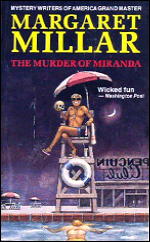Sun 13 Nov 2011

MARGARET MILLAR – The Murder of Miranda. Random House, hardcover, 1979. Paperback reprint: International Polygonics, 1989.
The dust jacket calls this a suspense novel, but as of page 172 the story is still singularly crime-free. This in spite of the fact that the young lawyer Tom Aragon, who also had a prominent role in Millar’s previous novel, Ask for Me Tomorrow, is on hand again to turn in another satisfactory job of detective work.
The intent is instead a devastating attack on the California life style, with the easy target being the slightly wacky members of the terribly exclusive Penguin Beach Club. In truth, though, the delicate line between witty characterization and just plain potty characters is crossed more than once.
The ending, in particular, veers so suddenly from the semi-comical to a harshly bitter irony that only the vaguest sort of loss is the result.
Rating: B.
[UPDATE] 11-13-11. Series character Tom Aragon appeared in one more novel, Mermaid (Morrow, 1982), which I remember reading, but nothing more than that — which pretty much holds true for this one as well.
November 14th, 2011 at 5:28 pm
I’ve, so far, only read one Millar, from the Fifties,which seemed quite OK.
Could it be age that made her write B-mysteries in the late Seventies?
The Doc
November 14th, 2011 at 5:43 pm
I’d have to had read more of her crime fiction from the 50s and 60s to be able to answer that, Doc. In fact, going through the list of books she wrote, I see I’ve read more of her books from the 40s than the 50s & 60s combined.
But also keep in mind that a rating of “B” means an above average book, no matter how what I said in the review. Any reservations expressed are what kept it from being an “A” book, or a book well above average, as far as how much I enjoyed it.
For the most part, either I never read a lot of “C” or lower books, or didn’t finish them, so didn’t review them, or here it is now, well over 30 years later, and those that were, I haven’t reprinted them. Nor will I, most of them!
November 18th, 2011 at 9:59 am
I’ve read a number of Millar’s books. HOW LIKE AN ANGEL is the best of the bunch.
November 18th, 2011 at 1:26 pm
George
As I alluded to in Comment #2, HOW LIKE AN ANGEL is one of her books from the 50s and 60s (actually 1962) that I haven’t read.
I have a big gap between her early ones in the 40s to the ones like MIRANDA in the 70s toward the end of her career.
I wish I could say I’d ever read the ones I’ve missed, but in all honesty (and with no reflection on Millar), there’s very little chance I’ll get to them now.
November 18th, 2011 at 1:33 pm
Checking back, I’ve just discovered that I’ve already posted my review of MERMAID on this blog.
https://mysteryfile.com/blog/?p=2025#comments
What’s relevant is that in the comments there was a lot of discussion comparing the relative merits of Millar and her husband as writers, and I mean a LOT!
Here’s one of the statements I made:
“…even though I might also say that Millar is a “better†writer than Macdonald (for lack of a better word), given a choice to read a book at random by either Margaret Millar or Ross Macdonald, for sheer enjoyment I’d go with Ross Macdonald every time.”
November 18th, 2011 at 3:31 pm
No question that Ross Macdonald was a better stylist, Steve. But he tended to write the same book over and over. When he died with Alzheimer’s, the reasons for this became apparent.
June 1st, 2012 at 1:03 pm
I have no memory of posting that comment in November 2011, Steve, and would appreciate you deleting it. Per my books I’ve read list, I had already read one of her books by then and just read another for this FFB. And I liked it, a good deal.
June 1st, 2012 at 4:05 pm
Richard
Previous comment deleted. No problem!
— Steve
September 8th, 2016 at 5:27 pm
C-mon, George! Millar died in 1983, but had been writing professionally since the forties. Are you really suggesting he’d been suffering from Alzheimer’s for forty years?
I actually don’t think he was writing the same book over and over; he was more like a jazz player to me, endlessly reworking the same piece, improvising like mad, never quite playing it the same way twice.